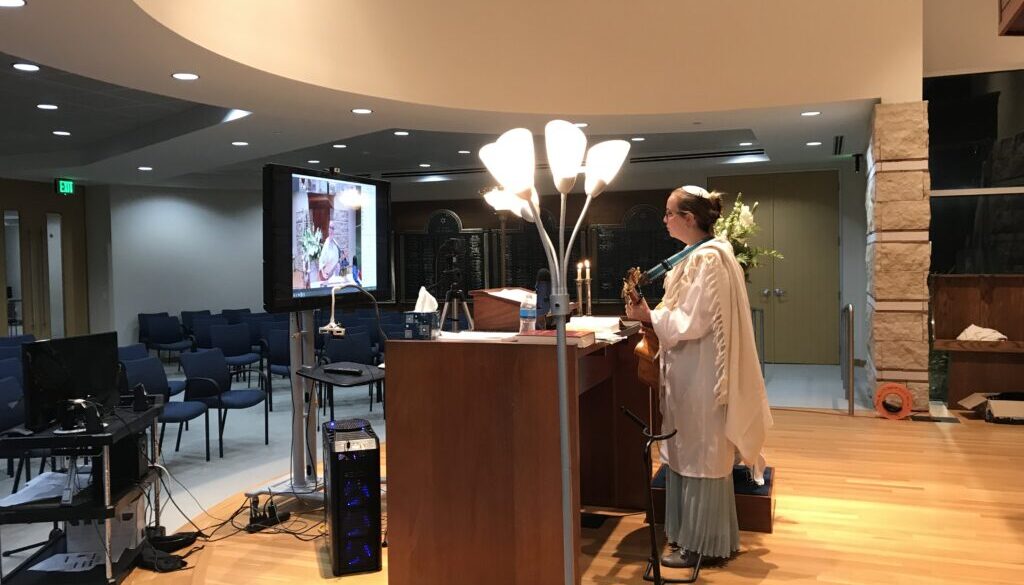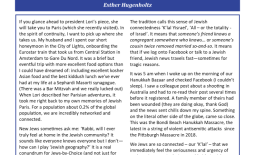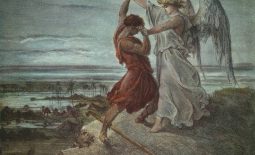Kol Nidrey Sermon
Dear Family,
The human family. All of us. Remember that idea? It seems like a fata morgana almost, this idea that we are one species, inhabiting one planet. Never have we lived in a time where science and technology have brought us closer together and the frailties of the human heart have pulled us further apart. And let’s be clear here: we have not been separated from each other or pitted against each other because of the mere impulsivity of our individual behaviors. We are where we are now for the simple reason that we’ve broken faith with each other.
We usually associate our Prophets with those who speak to God, who can access some kind of esoteric knowledge about the universe and our place in it. But that’s not what defines a Prophet. A Prophet is someone who stands in the breach between God and human. Whatever we feel about God—and we’ve already written a letter to God—it is the human part that is really important here. A Prophet’s role is to remind us, through good or ill, what we are and what we should be. A Prophet tells us like it is.
Yom Kippur has its own Prophets. Jonah comes to mind; the world’s biggest misanthropic curmudgeon and gourd-obsessive (I wonder whether he wanted pumpkin spice with that?) But I’m actually thinking more of the Prophet Malachi. While many Prophets talked about issues of justice, Malachi recast those issues in terms of trust and betrayal.
‘Have we not all one Father? Did not one God create us? Why do we break faith with one another, profaning the covenant of our ancestors?’ He asks rhetorically, and talks about divorce. Yes, as in spousal divorce. It seems like a weird thing to get fixated on, right? His point is that when even the most intimate and holy of relationships breaks down – that between lovers and mates – then what does that say about the rest of us? It reminds me of this Midrash on the ‘k’ruvim’, also known as ‘cherubim’, the decorative statues of angels on the Ark of the Covenant. The Midrash says that if all was well with the Jewish people, the angels were locked in an embrace. But when there was strife among the people, they too would turn away. I don’t think it’s coincidental that Malachi describes the wife in his analogy as the ‘chaverah’, the friend, in one’s marriage. His idea of marriage wasn’t transactional. It was covenantal. And part of that covenant is standing with your friend, your partner, your sibling, your equal.
We’ve messed up pretty good on that one, haven’t we, dear siblings?
See, it’s easy to love the people you like. These days, and even more with the pandemic, we hang out in little psychological silos. If we don’t sort ourselves in heavily polarized categories, then the relentless algorithms of Big Tech will do it for us. We like and ‘like’ (as in hit that thumbs up button) people who think like us and live like us. I get it. I’m guilty of it too. It’s comfortable. We get to make the little jokes, needle the ‘other side’, feel good about being right. But every time we feed into that impulse, we lose sight of the humanity of others and the profound drivers of their ideas.
Social psychologist Jonathan Haidt describes this as being ‘the righteous mind’, meaning human beings are primed to validate their own moral instincts, at the expense of seeing the other’s point of view. Professor Haidt goes as far as to argue that there are different psychological responses to moral psychology that have partisan consequences. Liberals, he asserts, are more likely to think in terms of equity. Conservatives, he insists, are more likely to think in terms of purity. Neither is more virtuous than the other, but they funnel our thinking patterns and gut reactions into predictable responses. Now, friends, these responses are about life and death issues, and that, my friends, makes it all the scarier.
The world has been unjust and cruel since Cain lured Abel into that field and pummeled his brother to death. Yom Kippur is the time when we should frankly admit to how we have been inoculated by our privilege – relative or absolute – against the vagaries of our world. Most of us have not had to deal with or even witness the grinding, dehumanizing poverty that afflicts hundreds of millions on this planet. I know that shameful feeling of walking past someone asking for money on the street and consciously hardening my heart, keeping my wallet closed in my pocket.
That’s a painful truth I have to live with; just like many other painful truths about my privilege and good fortune. My carbon footprint, my skin privilege, my rising through the ranks of our increasingly toxic meritocracy. Through all of these I have sinned before all of us, ‘chatati’. We have been able to shelter ourselves for so long, haven’t we? Even if we were idealistic and civic-minded and wanted social justice and advocated for social change—still, we have broken faith with each other and reneged our vows, ‘kol nidrei v’esarei, va’chamarei, v’konamei, vu’chinuyei, v’kinnusei…’. We have broken our vows, renunciations, bans, oaths formulas of obligation, pledges and promises to be our sibling’s keeper.
And now, brothers and sisters, the great reckoning is coming.
I remember this summer, I attended a listening post in Pheasant Ridge, Iowa City. The Black Lives Matter protests were in full heat and Mayor Bruce Teague and Mayor Pro Temp Mazahir Saleh had gathered us to talk, share and listen. I heard story after story about how the lives and bodies and dignities of my Black and Brown siblings were being violated; from the subtly dehumanizing to the life-threatening. I will never forget the last speaker; a young girl, she can’t have been more than ten years old, perhaps twelve. She stood up at the microphone, tears streaming down her face and she cried, ‘All we want to do is live.’
All we want to do is live.
I recorded it and vowed to bring her words to our congregation. Sometimes it’s really that simple as that ‘tza’akah gedolah’, that ‘great outcry’. The Rabbis of the Midrash ascribe such a tza’akah gedolah to someone else too: a young woman in Sodom and Gomorrah, who had done justice by feeding the poor. Any act of kindness to those more vulnerable, was outlawed in Sodom and Gomorrah. It’s not just that the citizens of the Sin Cities were selfish or callous. It was much worse than that: their legal system was predicated on oppression and cruelty. And this poor girl had given a morsel of bread to the poor and as a punishment, the Judges of Sodom condemned her to die. She was dragged on top of the roof of a tall building, slathered with honey and stung to death by hundreds of bees. It is her cry that came before God.
You know what Tanakh, the Hebrew Bible, examines? Power. That in order for us to be able to break the bond between us, we need to have power. Any student of chemisty knows that you can only break molecular bonds through the application of power or energy. In Malachi’s times it was callous husbands divorcing their wives. In our time, we have divorced each other. But it’s not a no-faults equal opportunity kind of divorce. No, the strong have abandoned the weak. ‘Shalach’, is the word that Malachi uses for divorce. To send away; to dismiss.
That’s right. We have dismissed.
We have dismissed the four hundred year old call for racial justice, since the moment the first enslaved Africans were brought to these shores in 1619. We have dismissed the impact of unjust legislation that indicts but does not convict, that does not offer accountability or reconciliation and brings little healing to this fractured land. We have dismissed the price of poverty, of economic decline, of environmental degradation, of climate change, of the West Coast burning and the Gulf Coast flooding and our state battered by a Derecho. We were comfortable, right?
Now, 200,000 lives have been extinguished in our country and many millions more diminished due to COVID-19.
Brothers and sisters, we have truly broken faith with each other. We have betrayed each other; sometimes with intentional malice; sometimes with lazy complicity and complacency. I know I have. It’s a hard thing to hear and it’s a hard thing to say and an even harder thing to bear, with honesty and humility. Yet, we have been humbled; we have been brought low in 5780. We make not like the language of sin; but here we are; al chet she’chatanu lefanecha, for the sin we have committed against humanity.
Prophets are pretty lousy policy makers. That’s not their job. Prophets don’t write laws or vote on amendments, hash out political deals in congressional back offices or develop economic strategy in corporate boardrooms. But they do remind us to get in touch with our own inner Prophet. To look ourselves in the mirror, with unflinching and excruciating moral clarity. None of us wants to admit it. But it is only t’shuvah, our inner realignment and our genuine repentance, that can avert the harsh decree. From that flows our ability for tefillah, prayer, a sincere calling out to God (or the Universe or the Flying Spaghetti Monster for all I care); a genuine call of the heart for help, mercy and transformation, and from that one flows righteous, restorative, action—tzedakah.
We have broken our vows to each other.
Malachi was right, you know. Halo Av echad l’chulanu? Do we not have One Parent? Let’s be so intensely humbled by that. Ethical monotheism is not a throwaway phrase. It is the uncompromising commitment to our human family; to all of us, my brothers and sisters and siblings. And in that commitment, there is no place for dehumanization, whether by whim or by law, whether through structural racism or economic exploitation, whether through active betrayal or passive acquiescence.
I’ll leave you with the words of another Prophet, a youngish and contemporary one, a Prophet with the understanding of a philosopher and the quill of a poet; one Ta-Nehisi Coates. Mr. Coates wrote a letter too, to his beautiful Black son, a book called ‘Between the World and Me’:
“Race is the child of racism, not the father. And the process of naming ‘the people’ has never been a matter of genealogy and physiognomy so much as one of hierarchy… Belief in the preeminence of hue and hair, the belief that these factors can correctly organize a society and that they signify deeper attributes , which are indelible–this is the new idea at the heart of these new people who have been brought up hopelessly, tragically, to believe that they are white… Perhaps they will truly become American and create a nobler basis for their myths… As for now, it must be said that the process of washing the disparate tribes white, was… achieved… through the pillaging of life, liberty, labor, and land; through the flaying of backs; the chaining of limbs; the strangling of dissidents; the destruction of families; the rape of mothers; the sale of children; and various other acts meant, first and foremost, to you and me the right to secure and govern our own bodies.”
Listen. Hearken to this voice and hear the call of our Divine Parent. Let us set aside our heresies and put away our idols. None can be the father or mother of any of us than the God of our common humanity; we shall bend the knee to none else, and we shall covenant ourselves to none other than each other.
Each of you—each of us—is beautiful and sacred and Divine, and I love you all deeply, my dear human family.
Love, from one of us.




